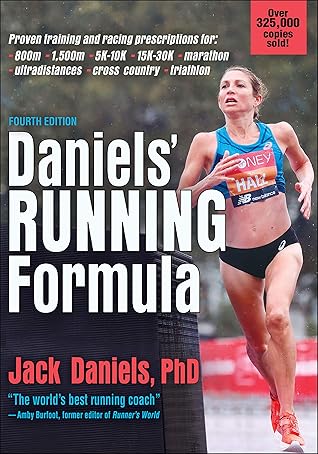More on this book
Community
Kindle Notes & Highlights
Arm and Leg Flapping
Recovery Run
run for 2 minutes or for 800 meters.
entire circuit three times, preferably two or three times each week.
Longer-distance specialists usually do best by concentrating on T workouts and discontinuing I sessions (unless a race is the type that stresses the aerobic system to its maximum).
races are part of training, and the duration of a race determines what training benefit
is reaped.
in a 5K, you need to be ready to race after the first couple of miles, and in a 10K, the race really begins at about the 4-mile (6.5 km) mark.
Up to that two-thirds point, you need to see how relaxed you can be while still sticking
with the pace (or competitors) that your ...
This highlight has been truncated due to consecutive passage length restrictions.
Both the 5K and 10K are primarily aerobic events, with most 5K races performed at about 95 to 98 percent of O2max and 10Ks ...
This highlight has been truncated due to consecutive passage length restrictions.
mental aspect of these distances is certa...
This highlight has been truncated due to consecutive passage length restrictions.
Both 5K and 10K runners need to make sure their training maximizes aerobic power, economy of movement, and lactate threshold, which requires a good mix of R running, I training, and T running.
Cross country races involve large fields of competitors and the footing is varied, from hard surfaces to grass or even mud.
many cross country courses include running up and down hills of various grades.
focus on positive experiences.
It typically takes about 10 minutes for the running muscles to start increasing their temperature.
R training on a track where you can compare times over
specific distances with times you have done in the past.
T runs on the road,
a successful 10K training plan will prepare any runner quite well for races in the 15K to 20K range,
Sometimes going a little slower brings you to the finish line faster.
The triathlon consists of three separate events: swim, bike, and run, generally in that order.
training for a triathlon demands all-a...
This highlight has been truncated due to consecutive passage length restrictions.
Triathlon training requires two types of training.
First, it’s important to practice each of the disciplines when you’re relatively fresh.
second consideration is that in a race you’re already fatigued when you start the cycling and running legs, so it’s necessary to replicate those conditions in your training and schedule a...
This highlight has been truncated due to consecutive passage length restrictions.


